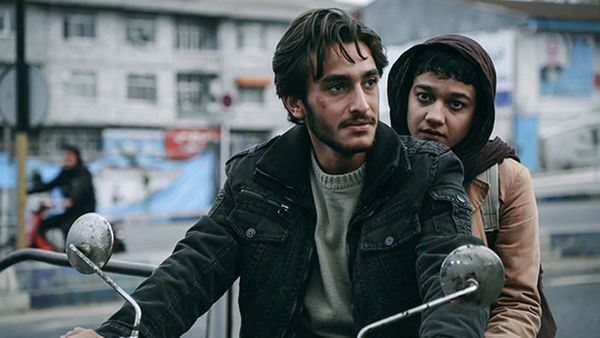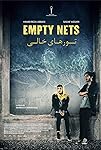Eye For Film >> Movies >> Empty Nets (2023) Film Review
Empty Nets
Reviewed by: Amber Wilkinson

“Money is all that matters”
The sentiment echoes throughout Behrooz Karamizade’s moving and melancholy debut, even though it is initially driven by love. Amir (Hamid Reza Abbasic) and Narges (Sadaf Asgari) are desperate to be together but tradition dictates that he needs to get together a hefty dowry before they can approach her parents. The Iranian-German director establishes the pair of them as sympathetic from the off as we see Amir lose his waiting job after taking a moral stance on something his boss wants him to do - a stand that Narges endorses.

With work hard to find, however, Amir has little option but to take a position at a far-flung fishery outside of the city where the work is hard and the moral waters distinctly murky. The day job is less than lucrative and thanks to Amir’s strong swimming ability - an attribute, like much here, that is unobtrusively established by Karamizade early on - he is soon enlisted in the poaching operation of his boss (the ever-reliable Ali Bagheri), removing rubbish from the nets underwater so the fish aren’t put off and delivery illegal cavier to a city restaurant. Meanwhile, thanks to Narges’ parents, the pressure is on to reveal their relationship.
Empty Nets would make an excellent double-bill with Alex Camilleri’s neo-realist fishing drama Luzzu, which also shows the nets of a young person’s hope being torn asunder by the rocks of reality. Like Camilleri, rather than opt for melodramatics Karamizade keeps things rooted in a grimy reality that opens out from Amir’s life into a snapshot of the country. The sense of general eco-decline, evidenced by the rubbish that washes up on the beach, is emphasised by Amir’s initial attempts to clear it up, which like so much in his life, are futile in the face of the bigger picture. Older men at the fishery are seen to hold sway, while the younger ones scrape by, including Amir’s roommate Omid (Keyvan Mohammadi), a writer living in fear and desperate to leave the country.
Karamizade is deft at capturing shifting moods. There’s a real heat of romance to early scenes between Amir and Narges, whether it’s the excitement of a dodgem ride or the subtle longing we see generated as they walk to meet each other from either side of a restaurant window. These contrast strongly with the sense of threat at the fishery and the familial poignancy of Amir’s conversations with his mother (Pantea Panahiha). Cinematographer Ashkan Ashkani adds to the strong sense of atmosphere, with lensing that emphasises the barren bleakness of the Caspian coast through strong use of blues rather than simply let all the colour drain away. Although Amir’s trajectory dominates here, as Abbasic's baby-faced character becomes compromised and finds his dreams drifting away on the tide, Karamizade doesn’t forget to indicate that Narges is trapped in a different sort of invisible net that is equally impossible to escape.
Reviewed on: 25 Jul 2023















